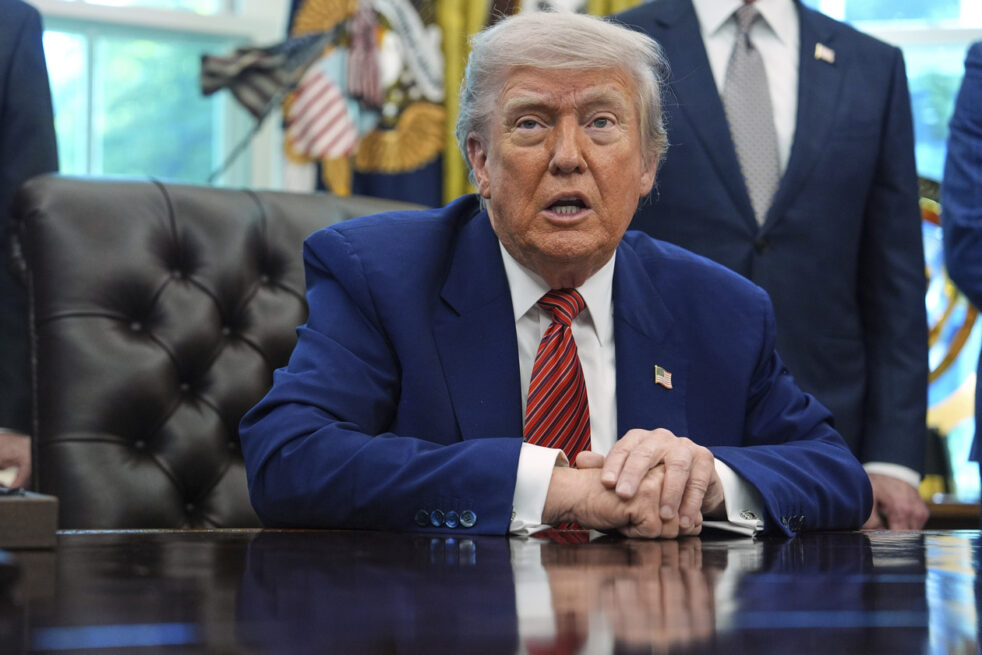President Donald Trump’s free-trade skepticism and affinity for tariffs catapulted him to the presidency in 2016 and played a significant role in his 2024 victory. However, in practice, those tariffs are marked by erraticism and unwillingness of Trump to commit, plunging the economy into dire uncertainty— possibly the worst trade policy outcome.
Trump’s infamous “Liberation Day” caused the largest Dow point drop since 2020, as well as a bond market crash prompting him to alleviate (for 90 days, tantamount to permanent in the age of short-attention-span politics) his sweeping tariffs. Similarly, his trade war with China came to a truce, as Trump promised to reduce his 145% duty on their imports to 30%. In May, he again threatened EU tariffs, before backing off two days later.
The president has dubbed this trade strategy as “negotiation,” though it remains to be seen the benefits Trump concedes from those countries– especially when he displays such willingness to back off shortly afterwards. The stock market, predictably, rises and falls with every tariff announcement and repeal. Insofar as the stock market may be used as a barometer for the general economy, this erratic tariff policy has yet to yield any other economic effect but uncertainty.
By nature, uncertainty ensures that investors hold their money as they have no idea what effect the economy will have on their investment. Unpredictability is arguably worse than predictable loss. As mentioned, trade policy drastically changes American markets, especially in the sweeping fashion that Trump is known for. With his revocations of now two dramatic changes to trade policy, increasing uncertainty and thereby decreasing investment, this indecisiveness has not aided anyone.
Trump surrogates often argue that these tariffs gave the U.S. leverage against an ascendant China as well as promoted domestic industries, but these effects cannot bear fruit if the tariffs are reversed and will only inflict economic pain with no hope for future recovery. No sensible investor would put a dime into the American system if Trump continues not to commit to his own economic plans.
Following his highly-publicized break from the President, Elon Musk said he believed that Trump’s tariffs will result in a recession. The bond market, typically considered less volatile than stocks, crashed alongside the stock market, causing deep economic pains from which the nation is still recovering.
Is this not the very “short-term pain” that Trump surrogates understood would occur? Why, then, would he revoke his unilateral Liberation Day tariff — thereby negating the “long-term benefits” of tariffs which were promised? The White House has classified the reversal of the China trade war as “the Art of the Deal,” a phrase often used by Trump and his supporters to explain away every administrative flip-flop as a part of the plan. Such is a pertinent method used to assuage voters to maintain confidence in the president, thereby ensuring his political stature as a calculated leader.
What is this “Art of the Deal?” To plunge America into economic contraction via unneeded uncertainty? To scare off American investment with capricious trade policy, reassuring rightfully concerned constituents with ad-hoc politicking? Regardless of one’s personal views on tariffs, it is obvious that this administration’s lack of commitment to either side of the debate is causing economic anxiety (and thereby diminished investment) which need not occur.
This is not to advocate for an unqualified anti-tariff position. Much debate is to be had about the efficacy of tariffs and trade barriers, but those meaningful debates matter little if Trump swings the tariff pendulum once again. This trade policy, insofar as it cannot commit to a single ‘camp’ of economic thought, has pigeonholed the nation into economic uncertainty, which Trump’s own alma mater believes may delay potential investment. Again, Trump advocates cite this as short-term pain for long-term growth. That claim should be studied, but it does not bear any investigation if Trump (as he has an affinity to do) backtracks on whatever tariff he announces. It matters little what the actual effects of permanent, unilateral tariffs are if no one can be sure if those tariffs will remain permanent or unilateral.
In the four months of the President’s second term, tariffs have been used less as a basis for an economic system (in the style of William McKinley, whom President Trump often cites as an inspiration for his view on trade) and more so as punitive measures and negotiating tools which go awry the second their actual effects are felt in America and abroad. Impromptu tariffs by definition do not provide the arguable benefits of a long-term tariff strategy, especially when they are backtracked so willingly, but they nevertheless disrupt other sectors of the economy such as the stock and bond markets. Trump’s erraticism has only given the country that “short-term pain” of tariffs while ensuring the “long-term benefits” never come to fruition, leaving America in what is the worst of both worlds in trade policy.
